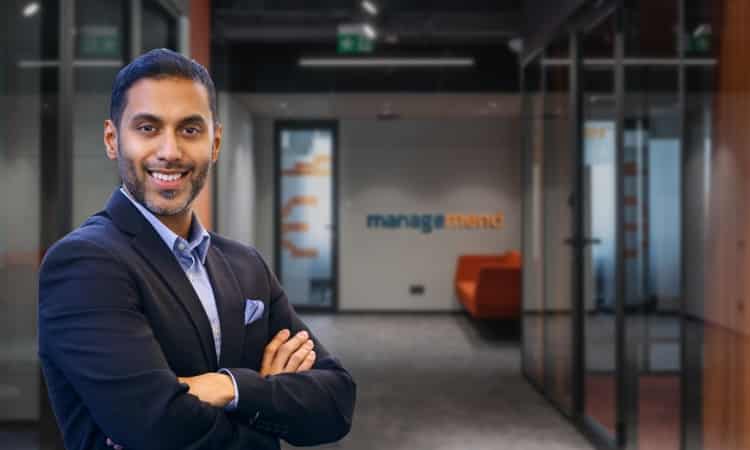Giving Transformation its Form
Thu 10 Mar 2022
As the market continues to recover post the pandemic, organisations around the world are looking to revamp their entire business model.
We spoke to the CEO of ManagemenD, Altaf Jasnaik, a Growth Hacker who aims to create 1 million growth hackers like himself by 2030. He explained why his mission will save the world from any future market disruptions and how companies will work with management consultancies to disruption-proof themselves.
TheBrew (TB): What has been the focus of ManagemenD Limited’s research and what is the central finding you can share with us?
Altaf Jasnaik (AJ): More than 50% of all global Fortune500 businesses that existed in the year 2000, went out of business before September 2019. In a span of under 2 decades, most of the world’s prolific businesses seized to exist and vanished even before COVID. The pandemic has resulted in 100+ more businesses meeting their end and this shifting paradigm of either being disruption-proof or becoming disruptive has been the subject of our research since 2012.
The most intriguing finding that we have and see in our research year after year is that the majority of these businesses died due to different reasons. Those that survived or even grew during these dips have one thing in common which is that they’ve continued to transform. The most successful businesses of the century and the new entrants are all championing their transformation to stay ahead of everyone else.
TB: It sounds like the solution is rather simple. All businesses have to do is to continue to transform. Why aren’t enough businesses doing it then?
AJ: Great question. To understand this we have to look at the root of the problem. Most successful businesses are run by people who have managed to grow the business to a certain point based on their abilities and personalities matching the opportunities their businesses had in the markets they serve. When disruptions hit, these business people guarded their status quo instead of transforming and believed that they would be able to bounce back when things normalize.
In the past returning from crises and continuing to function required that businesses survive market crashes. Those that had the cash to burn through these crashes eventually came back to a market with fewer competitors resulting in momentary gains thanks to the reduced competition. However, when market disruptions led to innovative alternatives emerging, even the strongest survivors couldn’t make it.
Large businesses tend to be slow and are usually unable to see smaller, more agile disruptors using these crises to their advantage. To further aggregate the problem, some large businesses are transforming into agile versions of themselves to use the market crashes to their advantage. The speed at which these innovative alternatives to products and services are emerging is accelerating the death of many businesses.
As long as there are people in any business that believe they know how to survive, businesses will continue to go bust. If people are a problem, can businesses manage to run without them? The answer is not really, not yet at least. This is why not enough businesses are transforming even though they can. It’s the fixed mindset cemented by the past successes that are holding them back and keeping them from being in a growth mindset.
TB: So how do businesses fix this problem? What solution or advice do you have to offer?
AJ: Let’s first take a step back to get some perspective on the situation. It is imperative to think of it as an opportunity and not as a problem. While it is a problem that businesses are not transforming, we have to address it as opportunities to grow. As a species, we tend to respond to opportunities better than we do to problems.
If businesses see their or their market’s lack or slow pace of transformation as an opportunity, they will begin investing in addressing and ultimately overcoming it. Until this happens, businesses like ours cannot even begin to help. Once an organisation sees the true potential of becoming a better, more future-ready version of itself, then there are several methods of orchestrating meaningful transformation.
The simple question any management has to ask of itself is how long do they believe they will be able to create new results by doing the same old things? The organisations that are brave enough to challenge themselves will find the need to look beyond the excuses that they have been giving themselves and that’s the first true step in transformation; realizing that you need it. It’s about not thinking of surviving, but wanting to thrive.
TB: For our readers, and for everyone in general out there, can you please explain what transformation really means and what can you expect from true transformation?
AJ: Very good question. Transformation is a whole bunch of different things to different businesses but when averaged out, it is always continuing to transform your business to continually remain relevant and current to your customers as well as the markets. If you believe your customers and markets will wait for you to keep up with them and the changing times, you are mistaken and need to give up that belief.
Disruptive businesses like Apple, Tesla or Huawei are pushing the boundaries of their customer’s imagination and showing them glimpses of a future that is more than possible. By painting a picture of what could be, they are changing the narrative of what is relevant today. En route to making that future possible they are constantly changing themselves and their approach to maintain their lead in addressing customers’ future needs.
This is why we believe transformation is being future-ready to the point where what you try to achieve becomes the future that customers believe to be the reality, worthy of their aspiration. This requires a constant transformation of everything. How do you do this is, fortunately, is not a secret anymore nor is it a game of chance.
TB: How does ManagemenD Limited help its customers to transform?
AJ: With more than a decade of research where we have studied how disruptive businesses have championed their own transformation, we have created a scientific, and mathematical formula for growth hacking and organizational transformation. We have created bespoke methods that are applicable to any business in any industry, at any stage of their existence be it a start-up, scale-up or established business.
We work with them, their leaders, and talents directly, to ensure an organization’s management & leaders are integral to the future of the organization. We like to call ourselves growth and management consultancy without any consultants. Instead of enslaving them to our consulting services, strive to make the client’s team/talents their own growth consultants and help them create disruption-ready or disruptive versions of their business.
Our product suite can be tailored to an entire organization or just the management team. It could also be customised to hand the reigns to fresh talents that could be mentored by senior leaders. No matter what permutation or combination a business chooses to apply, we are able to simplify the transformation process in measurable, repeatable steps that can make any business perpetually growth-minded.
TB: After winning an award in the UAE for your business model, you have since moved the business to the UK. How can businesses in the UAE benefit from your services?
AJ: We have moved our global head office to the UK with the vision to cater to the global world of business instead of staying focused on the UAE and MEA markets. However, with video meetings and hyper collaborative platforms now commonplace, our customers continue to enjoy the 95% + customer delight we have been able to deliver even before the pandemic.
If anything the pandemic has accelerated the adoption of these technologies and given us the much-needed impetus to move to the UK and go global. The British tech horizon is transforming rapidly and we are aiming to disrupt the world of management consulting with our world’s-first AI and ML-powered management and consulting app. Moving to the UK has enabled us to focus on creating this future with the wealth of options available here.
We have been studying the minds and personalities of individuals that have transformed businesses and continue to map the traits of these innovators and disruptors to create what we call the “Mendor-Persona”. The objective is to identify what these human traits are and find talents around the world to build an army of growth-minded transformation specialists.
Given the rate at which businesses are meeting their end, we estimate there is a need for 10 million growth-hackers and transformation specialists in the next 10 years to help the 500 Million+ businesses in the world. Our objective is to find these talents, and train them on to become the agent of scientific and repeatable transformation of businesses the world over. They are amongst us, these growth-minded transformationalists, just that they need to be awakened and mentored to lead the business transformation space globally.
About Altaf Jasnaik
Altaf Jasnaik is a Growth Management guru on a mission. Through his London based boutique Managed Disruption Services agency; ManagemenD LimiteD, Altaf has been helping businesses, senior leaders and talents become limitless through his “growth hacks” and “disruption by design” methods. He is a revered speaker and travels the world to present his philosophy of “celebrating disruption” and freely shares his research and work with growth-minded followers online.
online news Dubai | Dubai online news | news UAE | UAE Tolerance | latest | breaking | current headlines | Dubai breaking today | UAE breaking news | Breaking news | today headlines | entertainment | Sports update | Technology | World | Science | History | new | Environment | Update | Travel | Latest news | news update | Business headlines| United Kingdom | UK| Growth | disruption | disruptor | transform | transformation |

 Apr 19 2024
Apr 19 2024













